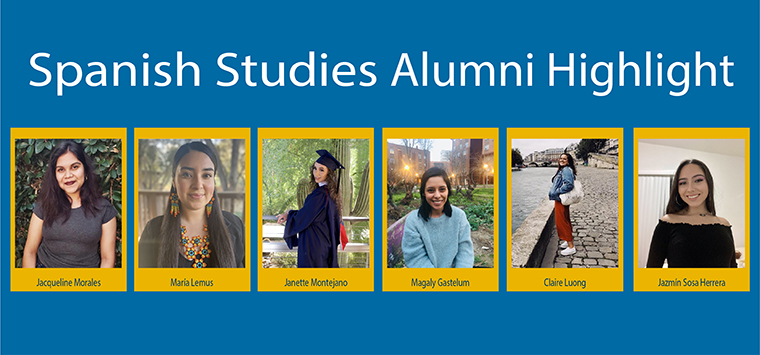Martha Pérez Sánchez
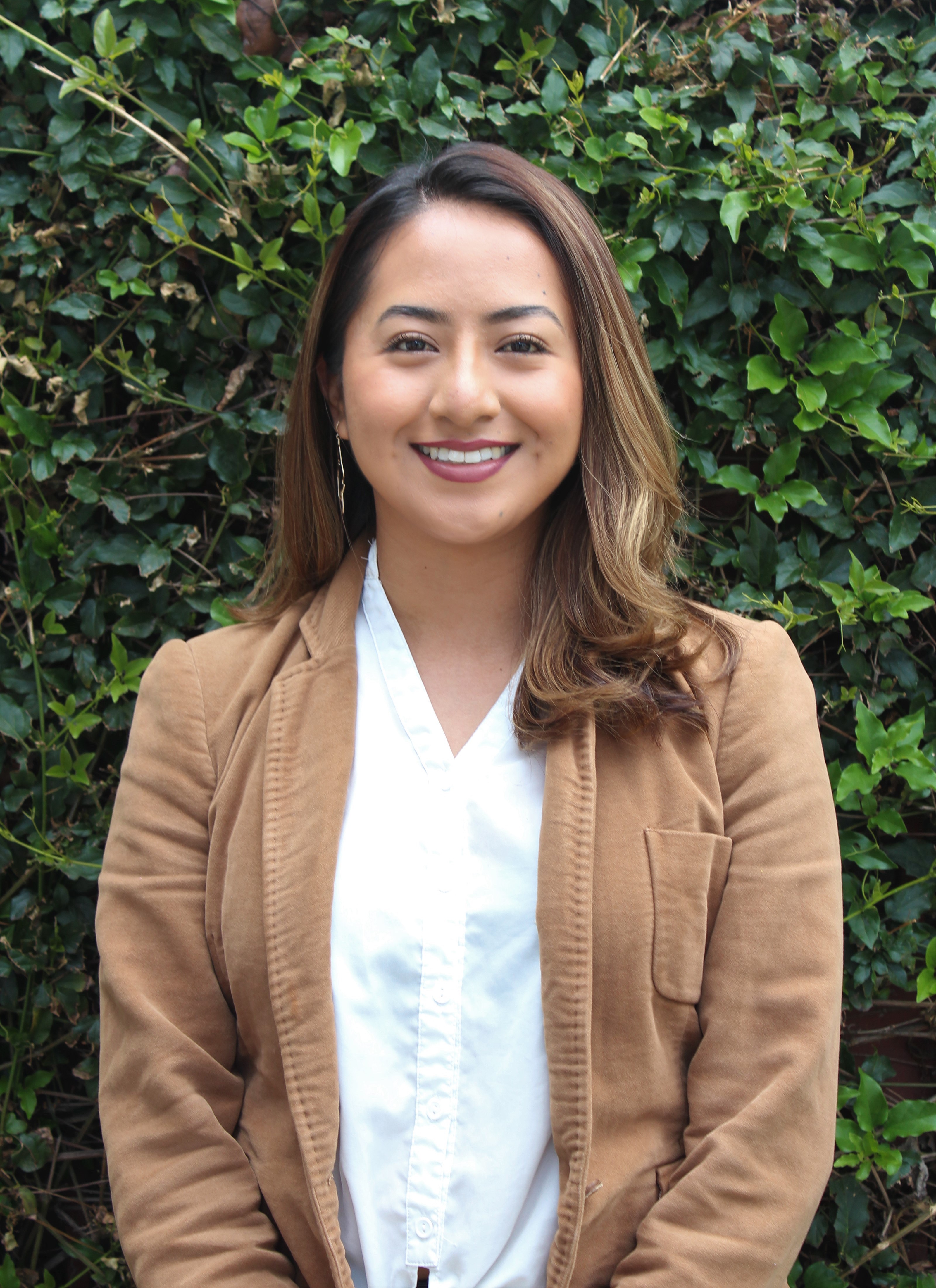 |
- Which year did you graduate from UCSC? Which degree(s) did you obtain?
I graduated in June of 2021, double-majoring in Spanish Studies, Applied Linguistics and Multilingualism and I also obtained a minor in Education.
- What did you do after graduation?
After graduation I worked for a couple of charter schools in Mid-City and South Central LA. There, I worked as a Teaching Partner for below-grade level students, implementing language and literacy programs. Most recently, I was hired as the Early Math and Literacy Lead at Grail Family Services, which is a Latinx non-profit organization serving the community of Mayfair in East San Jose.
- How has the training you received in Spanish Studies helped you in your current program?
The experiences, training and skills I obtained in the Spanish Studies major helped me become a well-rounded advocate for my Latinx community. It was imperative for me to understand the historical, political and economic stance of our Spanish-speaking communities in order to provide the adequate resources and help they may need.
Along with this, I was also able to develop my communication skills which I now use daily to connect with parents and professional partners. I believe the professors in the Spanish Studies program provided me with the tools necessary to grow in my field, and to this day, continue to show their support by being available for a quick check-in or any questions I may have.
- What are your future plans?
Although I plan to continue to work with the Mayfair community, I also plan on going back to school to receive my masters. I would love to do this in a foreign country but given my legal status my options are limited. The focus is still to be decided but I do know I want to either continue in the Spanish Education field or move towards language research. Either way, I want my future career plans to serve marginalized communities that can eventually help our people succeed.
|
Leonardo Chelin
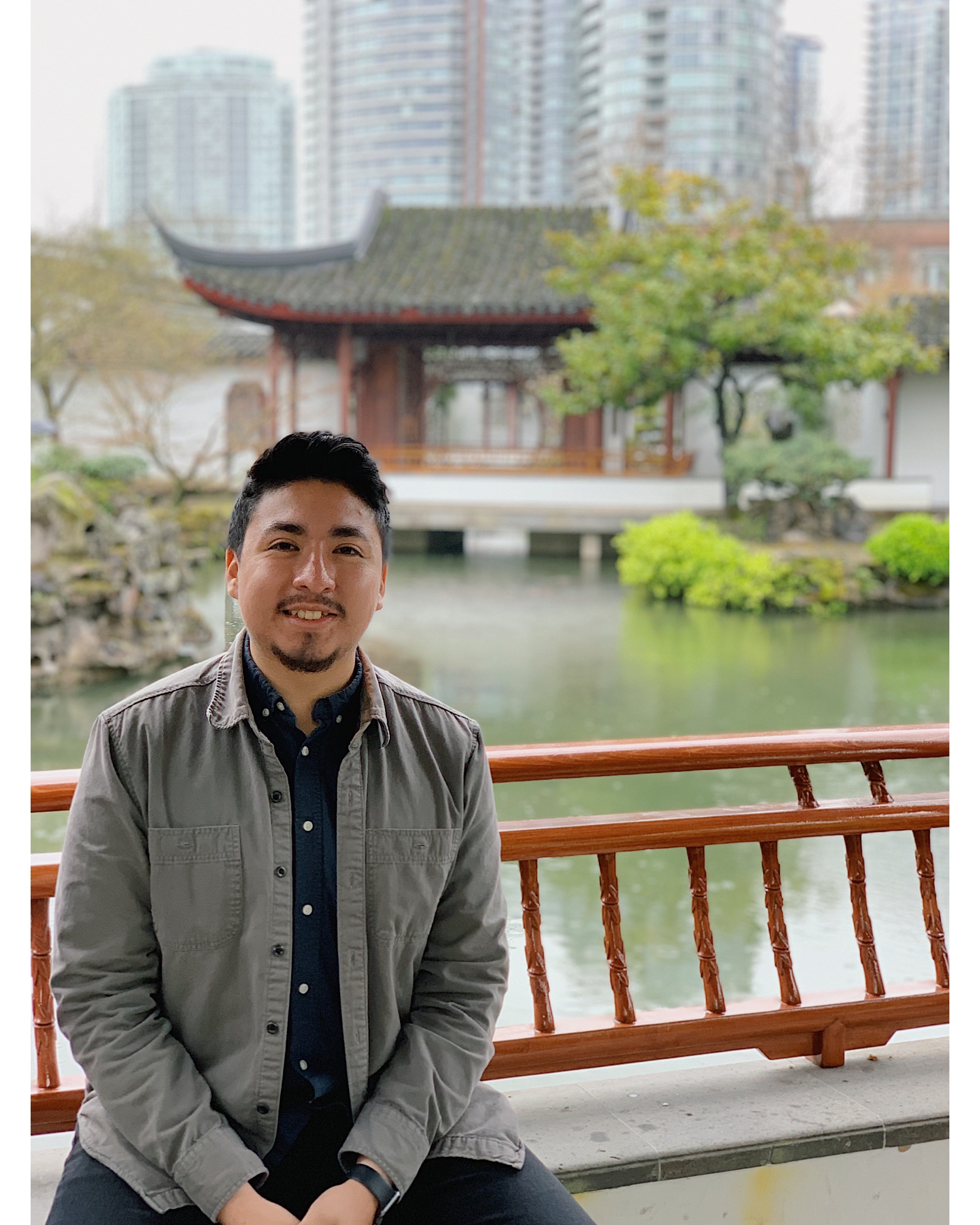 |
- Which year did you graduate from UCSC? Which degree(s) did you obtain?
I graduated from UCSC in 2018 with a double major in Psychology, Spanish Studies with a focus in literature, and a minor in Education.
- What did you do after graduation?
Weeks after I graduated from UCSC in 2018, I started one year intensive Master's program at the University of the Pacific. That same year, the program placed me at a high school in East San Jose, and I haven't left since. In 2019, I graduated with honors, earning a Masters of Education with a focus on curriculum and instruction. I now teach two levels of Spanish and I'm the 11th-grade level chair.
- How has the training you received in Spanish Studies helped you in your current program?
All of the training I received in Spanish Studies was extremely helpful while completing my Master's degree, as I was able to apply all of the skills and materials I used during my undergraduate studies. I will also say that the training I received in Spanish Studies allowed me to create a more defined sense of identity, especially when a lot of my peers were not BIPOC during my Master's program. In terms of my profession, I have modeled the way I conduct my classroom based on the awesome professors I had in the Spanish Department. Especially since I teach high school, providing opportunities for autonomy, group work, and discussion. I am definitely grateful for what I learned during my undergraduate career, which allowed me to have a strong foundation as a student and now a teacher.
- What are your future plans?
I plan to continue teaching and connecting with students. Moving forward I hope to have a bigger impact on the Spanish Department at our school. Though earning a Ph.D. is not a current priority for me, I'd love to become a college professor one day.
|
Rosa Sanchez
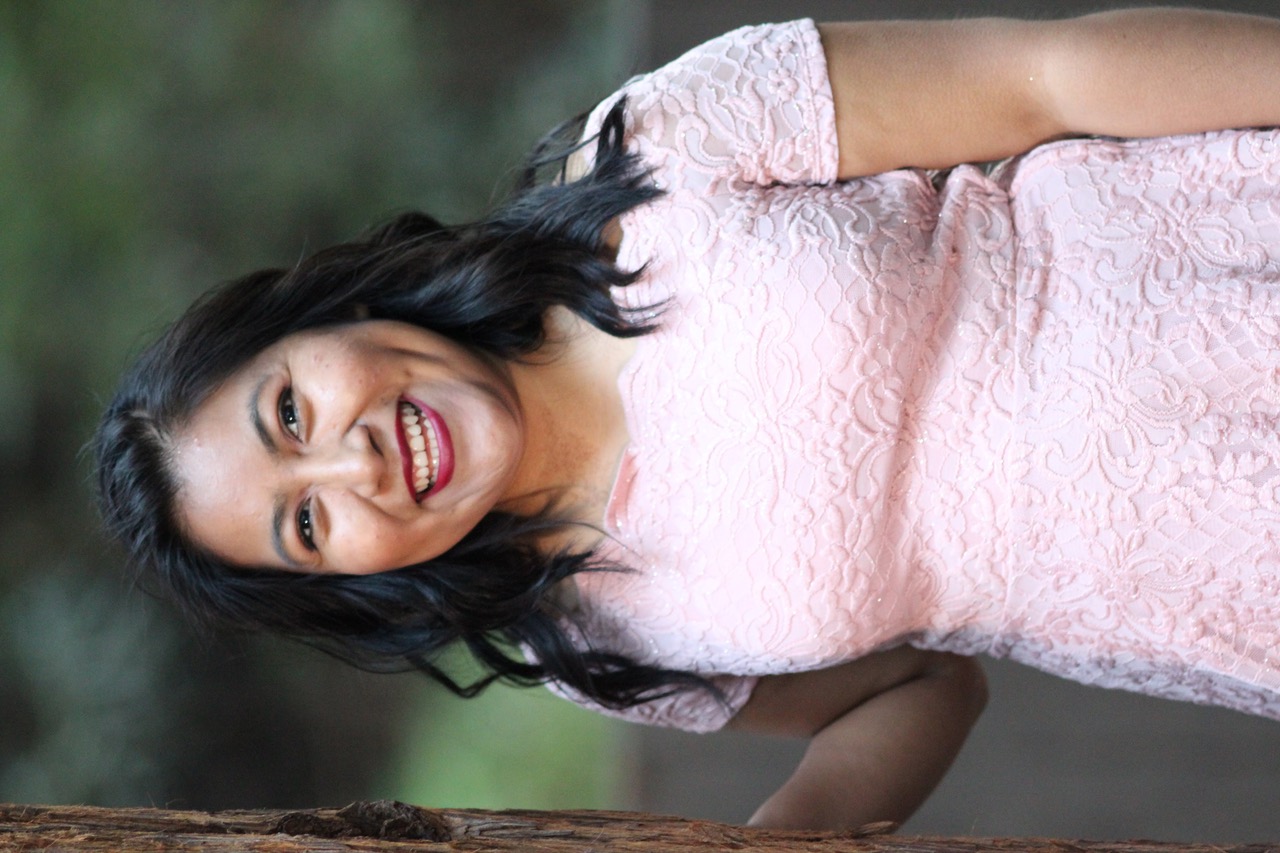 |
- Which year did you graduate from UCSC? Which degree(s) did you obtain?
I graduated from UCSC in 2018. I obtained a B.A. in Spanish Studies with a concentration in Literature and Culture and a B.A. in Latin America and Latino Studies.
- What did you do after graduation?
After graduation, I became a full-time paralegal at a local non-profit in Watsonville, CA. I provide legal services in immigration-related matters and information to the community primarily in Santa Cruz, San Benito, and Monterey Counties. In August 2020, I obtained my accreditation from the Department of Justice (DOJ) and now I can represent individuals before U.S. Citizenship and Immigration Services (USCIS).
- How has the training you received in Spanish Studies helped you in your current program?
The training that I received in Spanish Studies helped me in my current position because our non-profit serves primarily Spanish speaking communities. By speaking Spanish and being culturally competent I am able to breach the language and cultural barriers between the immigration legal system and our community. Thereby increasing the access to legal services and overall stability and well-being of the community. The lack of or uncertainty in immigration status can create tremendous instability and insecurity in families and communities, depriving them of access to services, and reduce their ability to function as productive members of society. My goal is to help address this problem by providing legal representation in a language that people can understand. In the Spanish Studies program at UCSC, I was able to find a community of great mentors and Professors who inspire me to become a better professional and community advocate.
- What are your future plans?
In the upcoming months (and probably year), I will continue working as a DOJ accredited representative and at the same time prepare myself to take the LSAT and apply for law school. Obtaining a Juris Doctor degree will allow me to continue to provide legal assistance to immigrant families from marginalized and historically underrepresented communities.
|
Cecilia Aguilar
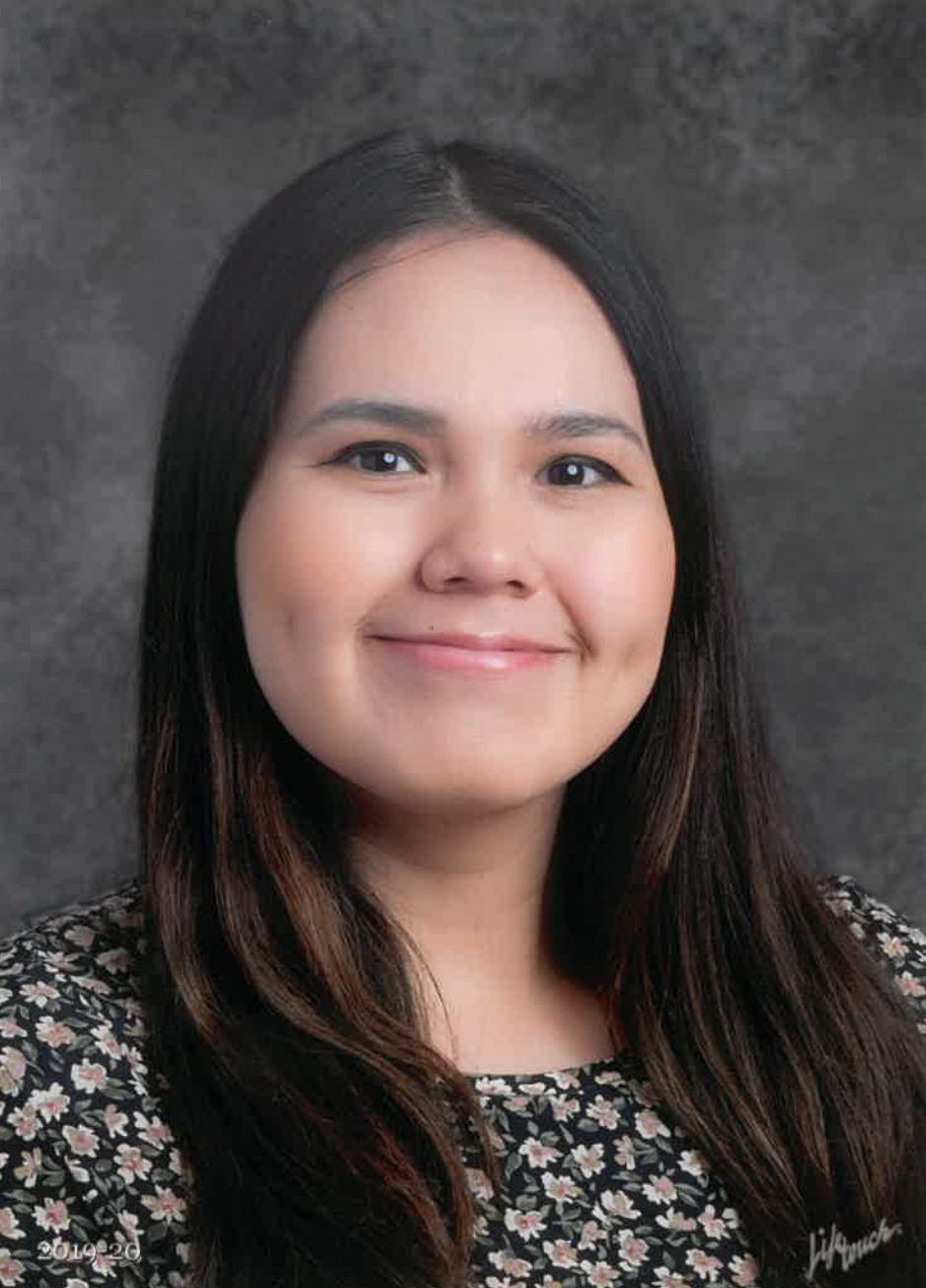 |
- Which year did you graduate from UCSC? Which degree(s) did you obtain?
I graduated from UCSC in 2017 with a BA in Spanish Studies with a concentration in Culture and Literature and a Minor in Education.
- What did you do after graduation?
I got to work immediately hoping I would fall into a position I loved off the bat. In 2018, I was hired as a community organizer at a local nonprofit before transitioning into a teacher role at Alpha Public Schools. I taught at Alpha for 2.5 years before pivoting into an Educational Technology company in 2021. I am currently employed by Family Engagement Lab as a Content Manager. My position is involved with writing content that supports bridging classroom academics to the home.
- How has the training you received in Spanish Studies helped you in your current program?
As a Latinx individual I identified with everything I studied in the Spanish Studies degree. The Spanish Studies program supported my transition into the real world by educating me about my heritage. The classes I took gave me a deeper sense of self and life mission. It was here where I learned about the struggles that I have endured as a person of color in the US. The Spanish Studies program taught me that I must use my skills to support historically underrepresented communities achieve their dreams in a way that the country has not seen before. My work is a reflection of my commitment to communities of color. I thank the Spanish Studies faculty at UCSC for helping me get here!
- What are your future plans?
I am a sitting board of directors member at Exploring New Horizons and I hope to continue growing in my leadership skills by becoming a member of a fellowship that will support the development of these skills. My hope is to become a leader in the EdTech space to continue supporting educational achievement in education!
|
Jacqueline Morales
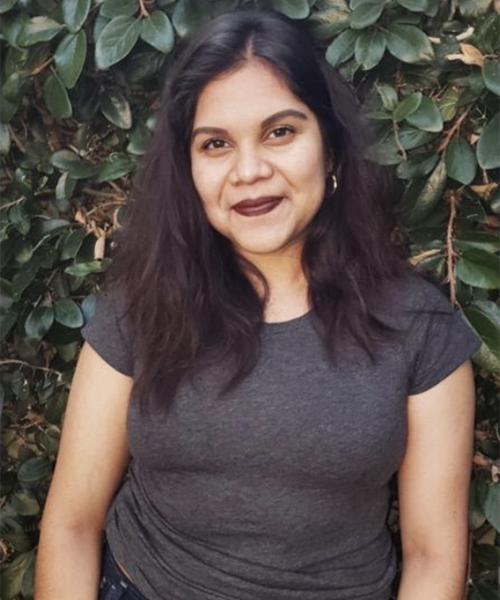 |
- Which year did you graduate from UCSC? Which degree(s) did you obtain?
I graduated in 2016 with a double major in Spanish and Legal Studies.
- What did you do after graduation?
Since graduating from UCSC I have been working as an Assistant Director of Tutoring at Learning Support Services (LSS), which is the largest tutoring program at UCSC.
- How has the training you received in Spanish Studies helped you in your current program?
When I began taking courses in the SPHS program, I became interested in studying Spanish and also became inspired to take on leadership positions. Throughout my time as an undergraduate student, I worked as a tutor, a peer advisor at the EOP office, and an office assistant for the LSS office. All these positions sparked my interest in working in student affairs in higher education and have challenged me to learn more about the nuances of teaching and learning. My time in the program in Spanish Studies also helped me understand what it means to serve Latino first-generation students especially at a Hispanic-Serving Institution like UCSC.
- What are your future plans?
I recently applied to several master's programs in Leadership in Higher Education and I just got accepted to the Master's program in Higher Education at the University of Michigan. I hope to embark on my graduate studies this Fall 2021 to eventually become a director at a learning center or student affairs program at a university to ultimately become a Dean or Chancellor of student success.
Jacqueline has recently been accepted into graduate programs at the University of Southern California, Columbia University, University of Michigan, and Harvard University. Jacqueline has decided to accept the offer from Harvard and will be starting there next academic year. Congratulations, Jacqueline!
|
María Lemus
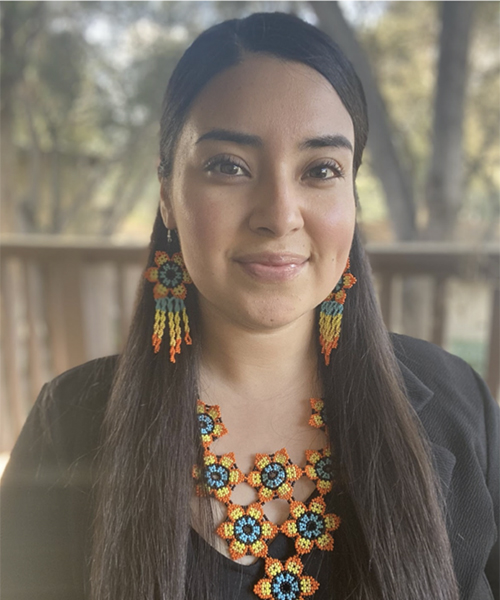 |
- Which year did you graduate from UCSC? Which degree(s) did you obtain?
I graduated from UCSC in 2017 and obtained a B.A. in Spanish Studies and a B.A. in Feminist Studies.
- What did you do after graduation?
After graduation I became a Middle School Math teacher at a bilingual school in San Jose, CA. I taught for 3 years before transitioning to my current role as an instructional coach at the same school. In my role as a teacher, I solidified my interest and passion for bilingual education models and the education field which I had become interested in during my studies at UCSC.
- How has the training you received in Spanish Studies helped you in your current program?
The training that I received in Spanish studies is directly aligned to my current role and my post-undergraduate career. At UCSC, I had access to a community of supportive professors in the Spanish Studies program who created a welcoming and rigorous community of learning. This community led me to work with professors who believed in my potential and opened opportunities for me to explore my various interests: from learning more about Latin American literature and history to learning about the science of Spanish linguistics.
More specifically, during my last year in Spanish Studies, I became highly interested in bilingualism and different models of bilingual education while taking various classes on bilingualism in the United States. After graduating, I knew that I wanted to continue learning more about the different bilingual models in schools so I decided to seek working in one. I have been working at a school with a dual-immersion language program (Spanish-English) that draws on the cultural and linguistic strengths that students bring with them, all of which I had learned about at UCSC. Additionally, I was able to feel confident in becoming a teacher thanks to the support and training I got from Professor González-Pagani who allowed me the opportunity to be a SPHS tutor. As a tutor, I had the opportunity to lead my own sessions that focused on facilitating discussions with peers on curriculum that supplemented the class.
In the end, as a student in Spanish Studies, I gained the knowledge and confidence to speak, write, and read Spanish in professional settings. In doing so, I solidified my education and training as a biliterate professional.
- What are your future plans?
I plan to continue my role as an instructional coach at my current school. I enjoy working with a community that not only values bilingualism but actively works to teach students in our community the importance of nurturing their linguistic strengths that will ultimately help develop leaders who understand their roles within their own culture and the greater society.
In the next year, I plan on advancing my training by applying to an EdD program in Educational Leadership. This will help further my leadership skills in making transformative and systematic change in bilingual education and teacher training in pursuit of educational equity.
|
Janette Montejano
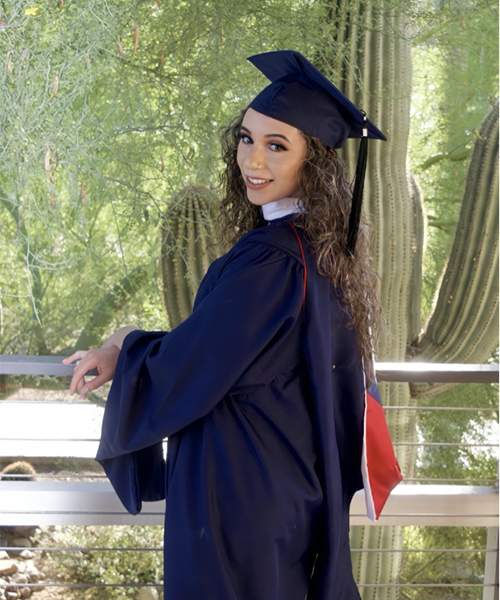 |
- Which year did you graduate from UCSC? Which degree(s) did you obtain?
I graduated from UCSC in 2017 with a BA in Spanish Studies.
- What did you do after graduation?
After graduating, I took a year off and later decided to apply to a few programs with the help and encouragement of my professors at UCSC. Ultimately, I attended the University of Arizona to study for a master’s degree in Hispanic Linguistics. I graduated in Spring 2020, took a much needed break, and I am now searching for a teaching position nearby since moving back to California.
- How has the training you received in Spanish Studies helped you in your current program?
The training I received at UCSC has given me a solid base for my studies in graduate school. Courses such as Spanish in the U.S. and Sounds of Spanish provided me with a background in phonetics, phonology, and sociolinguistics, which are courses I studied during the first year of my master’s program. I also received valuable training in programs such as Praat to allow me to analyze and manipulate speech. I can recall instances when my experience with Praat helped me tremendously in my phonetics courses.
- What are your future plans?
As of now, given the current circumstances, I do not plan on returning to school to continue on with a PhD. I plan instead to teach Spanish at a community college or a four-year university nearby.
|
Magaly Gastelum
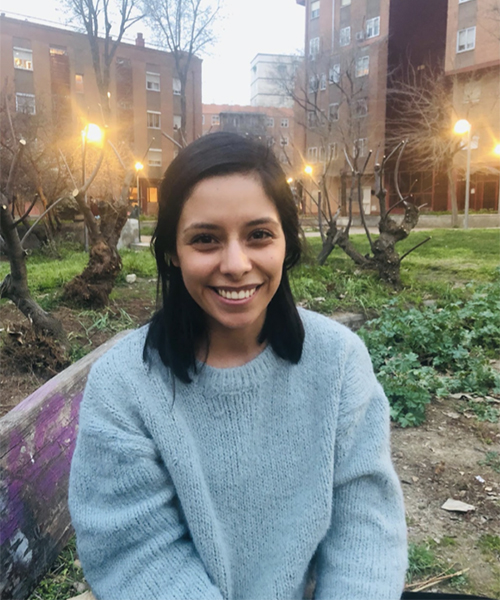 |
- Which year did you graduate from UCSC? Which degree(s) did you obtain?
I graduated from UCSC in 2018. I obtained a degree in Spanish Studies with a concentration in Languages and Linguistics and a minor in Linguistics.
- What did you do after graduation?
After graduation I spent a year working as a substitute teacher while figuring out exactly how to organize my life. I knew I wanted to go to graduate school, but I also wanted to live in Spain for a year or two before committing to school. Thanks to my Spanish professors at UCSC, I learned about the North American Language and Culture Assistants program in Spain and I applied. I was so happy to be selected to work in two elementary schools in Galicia. I spent a year in the program, and thanks to the generous pay, on weekends I was able to make short trips to neighboring towns and during holiday vacations, I was able to travel to Portugal, Germany, and Austria. Once my contract with the Language and Culture Assistant program was coming to an end it was time for me to decide whether I wanted to renew it or take my first step towards becoming a Spanish professor. I opted for the latter. I submitted applications to 3 different universities in Spain: Universidad de Oviedo, Universidad Autónoma de Madrid, and Universidad Complutense de Madrid. I accepted my offer from Universidad Complutense de Madrid where I now study a master’s called Investigación en la Lengua Española (Spanish Language Research).
- How has the training you received in Spanish Studies helped you in your current program?
The way professors in the Spanish Studies program carried out their classes is very similar to how my current professors organize their instruction too. Working in groups, participating in group discussions, and learning from each other’s ideas is exactly what I experience in my classes. So being exposed to this type of learning during undergrad prepared me to be a better student in my master’s program. More specifically, in terms of content, the Spanish classes at UCSC gave me a strong foundation in topics I am now learning about in much more depth. I may even sometimes use the materials from those classes as reference. In general, to me the Spanish Studies program, and its department was more than just a group of professors and a cohort of students learning Spanish linguistics or literature. It was a community that I belonged to and I truly looked forward to meeting with every class time. It was in this community of supportive professors —or mentors, rather— and classmates where I found my voice, a true connection with my heritage, and really: my identity . In fact, it was because of my experiences in the Spanish Studies program that I decided to become a professor and research topics regarding Spanish in the United States, such as code switching .
- What are your future plans?
In the near future (once I complete my master’s this fall), I will apply to doctorate programs. It would be a dream come true if I could attend the University of Illinois Chicago and be part of their Hispanic Linguistics program.
|
Claire Luong
 |
- Which year did you graduate from UCSC? Which degree(s) did you obtain?
I graduated from UCSC with a degree in Spanish Studies, with a focus on Language and Linguistics in 2019.
- What did you do after graduation?
After graduating from UCSC, I knew I wanted to look into master’s degree programs in Spanish Linguistics or Teaching Spanish as a Foreign Language. I spent the year after graduation working at a coffee shop and saving up as much money as I could while I was checking out master’s programs here in the U.S. and in Spain. I studied abroad for a semester in Barcelona when I was a community college student and I had always wanted to go back, and the cost of studying in Spain is significantly lower than in the U.S. I ended up visiting Barcelona, Pontevedra, Madrid, Bilbao, and Valencia in the fall of 2019 to visit some friends and see if I really wanted to study in Spain. After my trip (and a premature quarter-life crisis), I went ahead and applied to 3 master’s programs in Spain at the Universitat Pompeu Fabra, the Universitat de Barcelona and the Universidad de Navarra. A handful of Skype interviews later and the grueling paperwork process between the U.S. and Spanish consulates, I took a leap of faith and decided to accept my offer to the Universitat Pompeu Fabra to study a “Máster en Discurso: Comunicación, Sociedad y Aprendizaje”. Now I’m currently living in Barcelona! Due to the limitations the pandemic has put on in-person learning, I’ve extended my master’s from one year to two years in order to take full advantage of this learning opportunity. I’m discovering every day just how much I learn both inside and outside of the classroom and I am so grateful to be able to experience this immersion into Spanish and Catalan languages and cultures.
- How has the training you received in Spanish Studies helped you in your current program?
The UCSC Spanish Studies program was an incredible place for me to grow as a student and gain teamwork skills. The professors are knowledgeable and were always available to help out. One of my favorite parts of Spanish Studies was how our professors encouraged us to communicate and learn together. Teamwork, study groups, peer tutoring, and great communication between myself, my classmates, and our professors were so valuable to my training. We studied beyond just textbooks and theory and really were able to put our learning into practice. I also deeply appreciate the ways in which the department designed curriculum to fit the needs of both heritage Spanish speakers as well as second-language learners, like me.
- What are your future plans?
Whoa there— heavy question! I’ve got another year ahead of me in this master’s program here in Barcelona and I’m hoping to delve deeper into studying the processes of learning and Critical Discourse Analysis. I’d also like to continue working on becoming fluent in Catalan and continue improving my Spanish. Beyond that, stay tuned!
|
Jazmín Sosa Herrera
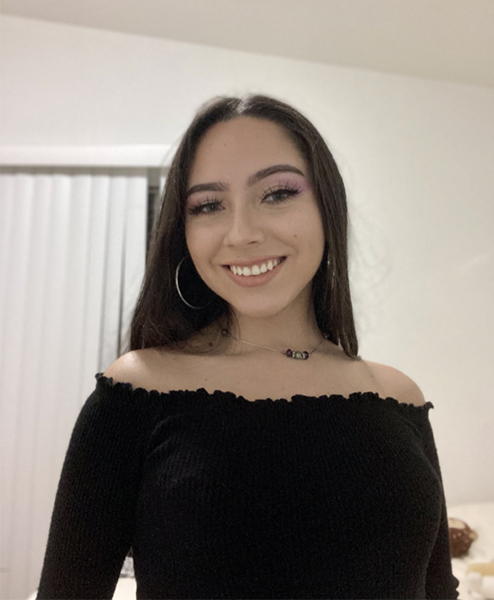 |
- Which year did you graduate from UCSC? Which degree(s) did you obtain?
I am currently double majoring in Spanish Studies and Politics. I completed the Spanish Studies major requirements in Fall '20 and have one quarter left to finish my Politics major requirements.
- What did you do after graduation?
I will be pursuing a one-year intensive Master’s in Teaching Spanish as a Foreign Language (Máster en enseñanza de español como lengua extranjera) at the Universidad de Navarra (Spain) in the fall.
- How has the training you received in Spanish Studies helped you in your current program?
The Spanish Studies program prepared me well by allowing me to receive a well-rounded understanding of Spanish language and literature. The master’s program is centered around theory and practice and although I haven't integrated into the masters' program yet, I have been told by the program director at the Universidad de Navarra that my educational and professional background made me the perfect candidate for the program.
- What are your future plans?
My future plans include successfully completing my master’s and moving back to the United States to pursue more teaching experience before I return to school for my Ph.D. in Spanish Literature. I hope to one day become a Spanish Literature professor so I will be working hard to fulfill that goal.
|










